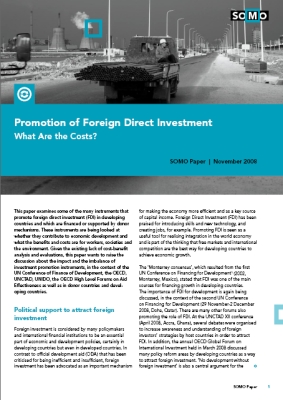
Waste of money in developing countries
The impact of the financial crisis on developing countries will be the subject of the second UN conference on Financing for Development, starting Saturday 29 November 2008 in Doha (Qatar). SOMO argues that tackling tax evasion and the ineffective promotion of foreign investment are important solutions for financing development.
Developing countries have been suffering from the financial crisis among others by less credit for production and trade activities or by more expensive credit for loans. The UN Conference on Financing for Development promotes foreign direct investment as a way to complement insufficient official development aid. However, the just published SOMO briefing ‘Promotion of Foreign Direct Investment: What Are the Costs?’ has found that the many instruments operated by donor-sponsored institutions to attract foreign direct investment, do not include a cost-benefit analysis nor guarantee a contribution to sustainable development.
“Attracting foreign direct investment without taking into account the economic, social, political and environmental costs in developing countries is only adding to the bill of the financial crisis, rather than finding solutions,” says Myriam Vander Stichele, one of the authors of the briefing.
In another research-based briefing, ‘Taxation and Financing for Development’, SOMO argues that tax revenues are an essential source of financing for development, which so far have been the subject of very little attention of the international development community.
“There are still many problems that undermine direct tax revenues in developing countries, such as tax evasion and aggressive tax avoidance by multinational companies. The financial crisis and the attempts to introduce new regulations for the international financial system are providing an opportunity to tackle these problems,” says SOMO-researcher M. Kokke.
Related news
-
The treaty trap: The miners Published on:
 Vincent KiezebrinkPosted in category:Publication
Vincent KiezebrinkPosted in category:Publication Vincent Kiezebrink
Vincent Kiezebrink
-
The treaty trap: The gas companies Published on:
 Vincent KiezebrinkPosted in category:Publication
Vincent KiezebrinkPosted in category:Publication Vincent Kiezebrink
Vincent Kiezebrink
-
 Oil and gas multinationals avoid up to $2 billion in taxes in MozambiquePosted in category:News
Oil and gas multinationals avoid up to $2 billion in taxes in MozambiquePosted in category:News Vincent KiezebrinkPublished on:
Vincent KiezebrinkPublished on:

